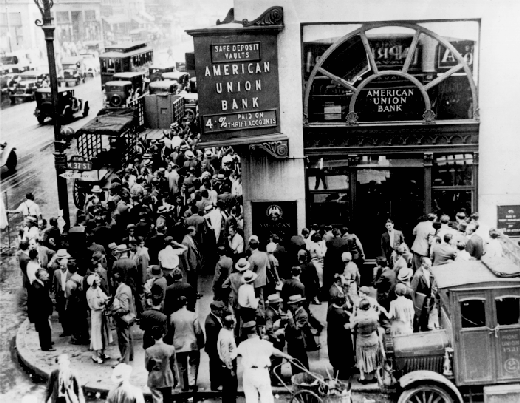Age old conflicts revisited. But of no surprise, bankers, like other groups of professionals, do not have a compelling history of self-regulation. – Ilene
Trust No Bankers
 The financial industry has always been wrong about the dangers of regulation.
The financial industry has always been wrong about the dangers of regulation.
Predictably, Wall Street and the banking industry don’t like President Obama’s plan to tax banks to help pay for the bailout. JPMorgan Chase CEO Jamie Dimon, an Obama supporter, said, "Using tax policy to punish people is a bad idea." Republicans generally denounced it, with RNC Chairman Michael Steele noting "this money has already been paid back by the banks" and calling it a "punitive tax" that "will hurt Americans’ savings and discourage job creation at the worst of economic times."
It would be a lot easier to accept this line of reasoning if JPMorgan Chase didn’t have about $40 billion in FDIC-guaranteed debt outstanding, and if the Federal Reserve didn’t have $27 billion of Bear Stearns assets on its balance sheet (which it had assumed to help JPMorgan take over Bear). Big banks might have paid back the money they borrowed under the Troubled Asset Relief Program, but they’re still benefitting hugely from the bailouts and taxpayer supports enacted after the crisis.
But there’s an even better reason to dismiss their concerns. A study of recent—and not so recent—financial reform and regulation yields two rules. Rule No. 1: The banks have no idea what kind of regulation is good for them. Rule No. 2: If you ever think the banks have a point, remember Rule No. 1.
This rule dates almost to the beginning of American history…
The same dynamic returned in the 1930s, after Wall Street and the commercial banking sector had essentially destroyed itself. The banking industry had proved utterly incapable of ensuring the safety of its customers’ deposits. Yet when the Roosevelt administration proposed the establishment of an industry-funded Federal Deposit Insurance Corp., Francis Sisson, then president of the American Banking Association, called deposit insurance "unsound, unscientific, unjust, and dangerous." After all, "overwhelming opinions of experienced bankers are emphatically opposed to deposit guaranties which compel strong and well managed banks to pay the losses of the weak."…
As it grew, the financial industry gained more of a voice in Washington and took a bigger role in shaping policy. And as it turns out, it is an almost perfect contrary indicator: Most regulations it has opposed have turned out to be good for the industry, while most regulations it has supported have turned out to be bad for the economy…
The savings and loan industry, for example, fervently backed the regulatory reforms of the early 1980s that freed banks up to go on a lending binge. Largely because of those reforms, the industry fell flat on its face. In the 1990s, Citigroup pushed for the erosion of the Depression-era Glass-Steagall Act, which required the separation of commercial and investment banks. The result: debacle. Wall Street agitated for the Fed and the government agencies not to regulate derivatives, not to regulate credit default swaps, and not to regulate subprime loans. The result: debacle. And perhaps there was no single policy move so damaging as the SEC’s 2004 action, taken at the behest of the CEOs of the large investment banks, to allow the banks to boost their leverage ratios from 12-to-1 to 25-to-1 and above. The CEOs of Goldman Sachs, Morgan Stanley, Merrill Lynch, Lehman Bros. and Bear Stearns pushed for the change, assuring all concerned that it would be good for them, for the system, and the country. At the time, SEC Commissioner Harvey Goldschmid said, "If anything goes wrong, it’s going to be an awfully big mess." Four years later, the freedom to take on more leverage proved to be their collective undoing.
If Obama’s proposed bank tax passes, the industry will be fine. The tax won’t hamper lending any more than the banks’ self-implosion already has. The same dynamic will play out if Washington enacts other restrictions on Wall Street and banks—a tax on trading, say, or letting the Bush-era tax cuts expire…
Full "Trust No Banker" article here.>>


